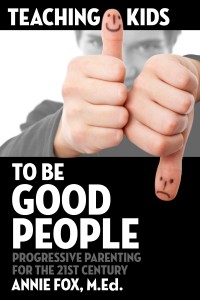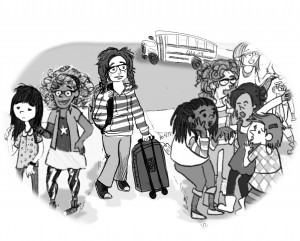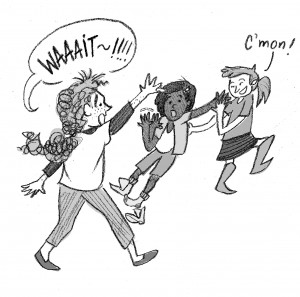|
|
August 14, 2013
For many girls and guys the start of this school year means starting over in a new community. That may include leaving behind good friends and a town you loved. Even if you didn’t love everything about your old school, you may not have wanted to move. In the middle of dealing with those emotions, you now have to get used to living in a new place. Once you locate the new school (Thank you, GPS!) you’ve got to get used to new teachers and a new schedule without getting totally lost on your way to class. On top of all this is the major challenge of figuring out where you fit in with hundreds of kids you don’t know.
If you are the New Kid in school, this blog is for you. (It’s part of my upcoming The Girls Q&A Book on Friendship, illustrated by the infinitely talented Erica De Chavez) If you’re not the New Kid, read on anyway. Then, hopefully you’ll be on the look-out for anyone at school (new or old) who needs a friend.
Q: My family just moved to a new state. I had to leave all of my friends. Now I’m at a new school. How do I make new friends?
A: Welcome to your new school! You’re probably excited and a little sad because you left some friends behind when you moved. Being in a new school without friends is like watching a movie without popcorn. Making new friends will help you feel more at home in your new home. But how do you make friends? Here are some tips:
1. Be friendly. That means act like someone who wants friends. Smile. Say, “Hi, I’m ____. What’s your name?” That lets kids know what a nice girl you are.
2. Be a good listener. Ask kids what your new school is like and listen to what they say. When people ask you questions, don’t brag (“I was the most popular girl at my old school.”) or make stuff up (“My old school had flying unicorns the students could ride on.”)
3. Ask to be included. This takes courage, so you may need some slow deep breaths before you say, “Hi. Can I play?”
4. Find a buddy. Be on the lookout for at least one girl who seems like she could become a good friend for you. Then follow the directions for #1.
Good luck and have a great school year!
In friendship,
Annie
PS If you want a couple more “sneak peeks” of The Girls Q&A Book on Friendship you’ll find them here and here.
UPDATE October 3, 2014: The Girls Q&A Book on Friendship: 50 Ways to Fix a Friendship Without the DRAMA is now available in print and on Kindle (the ebook can be read on any device, your mobile phone, tablet, or computer with the free Kindle reader app). Visit GirlsQandA.com for an excerpt, reviews, and to order your copy.

April 27, 2013
UPDATE (See end of blog for exciting news about my new book.)
Last month I started working on a new girls’ friendship book with awesome illustrator Erica De Chavez.
If you have a daughter, you don’t need me to tell you that girl friendships can be super complicated and fraught with challenges for girls and their moms! When things get sticky, kindness and respect often go missing in action and feelings get hurt all around.
Since 1997, girls from all over the planet have been turning to me for help in navigating their friendship messes. I guess that makes me an expert on social garbage. The girls who email me are tweens and teens. But I thought, if I write a book to help younger girls, maybe they will have easier friendships when they get to middle school. We can always hope, right? But hope is no strategy for making things better. What our girls need are effective tools for managing conflicts. Combine those tools with the self-respect and social courage to use them… now we’re talking about effective strategies for positive change.
Here’s a sneak peek at the book:
Q: Every time me and my friend have a private conversation, this new girl pulls her away. What do I do??
A: I don’t blame you for not wanting your private conversations interrupted. That’s so annoying! It sounds like the new girl has lots of power, but she doesn’t have all the power. If your friend didn’t want to get pulled away she could tell the girl to stop. She hasn’t done that yet. And you haven’t yet told your friend how you’ve been feeling.
Real friends tell each other the truth. Talk to her. You might say something like this: “I don’t like it when ____ pulls you away from me. How come you let her do that?” Then close your mouth and listen to what your friend has to say.
The next time the new girl tries to yank her away, your friend will either stand up for herself or she’ll let herself be yanked. That’s her choice. One more thing you might think about: Why is the new girl snatching your friend? It’s not always easy being the “new girl” who doesn’t have friends yet. I think that would feel LONELY! She probably just wants a friend and doesn’t know a more polite way to make one. Maybe you and your friend could team up with her and be friends together. That could work!
Anyway, the snatching stuff needs to stop. So talk to your friend. If things don’t change, what are you going do? You can either stand there watching the two of them go off together or you can reach out to other girls and make some new friends. You see, you have choices too!
______________
Sneak peek #2 and sneak peek #3 of the Girls’ Friendship Q&A Book.
UPDATE: July 22, 2014 After a year in production, The Girls Q&A Book on Friendship will be published by Electric Eggplant in September. Just in time for the new school year and the inevitable friendship drama heading toward your 8–12 year old daughter. Every girl needs friendship support from time to time. My book provides that plus:real world advice for navigating through the “social garbage,” friendship quizzes, and advice from older girls about how to be a Super Friend. If you’d like to preorder The Girls Q&A Book on Friendship for a girl in your life, or you’d just like a personal heads-up when the book is available, email me (Connect@AnnieFox.com).
UPDATE: October 3, 2014 It’s here! The Girls Q&A Book on Friendship: 50 Ways to Fix a Friendship Without the DRAMA is now available in print and on Kindle (the ebook can be read on any device, your mobile phone, tablet, or computer with the free Kindle reader app). Visit GirlsQandA.com for an excerpt, reviews, and to order your copy.

April 1, 2013
by Rick Ackerly, M. Ed.
Rick Ackerly is a nationally recognized educator and speaker with 45 years experience. He’s served as head of four independent schools, speaks to parent and school groups across the country and at education conferences. Rick is the author of The Genius in Every Child. Visit his blog to learn more about his innovative approach to education and parenting.
 Rick Ackerly knows about the genius in children
Last month, waiting at gate B22A at O’Hare a parent told me how frustrated she was with her teenage daughter.
“I’ve tried everything with Julie. I read the parenting books and tried it all, and it’s just not working.”
“What did you try?” I asked.
“You know. I confronted unacceptable behavior; I acknowledged her feelings while insisting on what I wanted. I tried not take it personally, but nothing worked.”
“How do you know it’s not working?” I asked.
She looked at me as if I were either goading her or simply an idiot. “She keeps doing the very things I tell her not to do.”
“With teenagers,” I said. “That is not a sign that it is not working. Adolescents are not constituted to obey. They are wired to disobey. Well, not exactly disobey. They are wired to make their own decisions—not necessarily good ones, but to make them. It is essential for their survival that they practice making decisions and noticing results.”
She, of course, was not relieved to hear this. Raising teenagers can be a nerve- wracking experience, and I have never known a parent who is in the throes of this enterprise to be easily pacified. And anyway, I never got the chance to attempt further consolation, because the boarding process began just as I was delivering my shocking message that “They are wired to disobey.”
I wish I had had the time to tell her about a conversation I had with 18-year-old Allison as I drove her home from a basketball game one Wednesday evening several years ago.
“I listen to my father,” said Allison, “because I have found that he tells me things that turn out to be true. Like ‘Never go out without money,’ he says.”
Allison had needed someone to talk to. Last Saturday night there had been a party where some of her classmates got drunk and trashed the house of a classmate.
She went on: “I wish I could talk to the parents of my friends and tell them how to talk to their kids. I wish they would tell them things like ‘Never go out without money.’ There we are at Starbucks and they’re all, ‘Allison, can you pay for this? I didn’t bring any money,’ and I go, ‘Sure.’ But it get’s annoying. They do pay me back, but it’s annoying. Parents ought to be careful what they tell their kids, so that when they give them advice, the kids will listen. What those kids did to that house was gross.”
“But you don’t always do what your father says, do you?”
“No, but when he talks, I do listen. Sure, it makes me mad when he tells me to get off Facebook and to start doing my homework, but I know he is telling me the right thing. That’s the point. I know it is the right thing for him to tell me. It makes him mad when I don’t do it right away, but that’s the way it’s supposed to be between parents and their teenagers. I know he’s right. I just have to do it myself. He has become like an authority. When he speaks I listen.”
Don’t all parents want to become “like an authority?” Listen to Allison. She is on to something very important.
Until age five, it is important for parents to back up their statements—with force if necessary. If a parent says: “No, you can’t have a candy cane before dinner,” then it is very important that the child does not eat a candy cane before dinner. “Eight o’clock bedtime” has to mean: In bed by eight. Period. If a parent says it’s bad for you and then let’s you do it, how can you trust such a parent? Why should a child listen to such a parent?
However, by age thirteen, the human brain is working to develop and consolidate the part of the brain that makes decisions—the pre-frontal cortex. By 18 the teenage brain has all the circuitry of an adult brain, but not enough practice. They know drinking to excess is not good for you, and that trashing a house is very bad, but the adolescent mind is open to other possibilities which must be tested to be “known.” Close relationships with adult authorities are important for helping kids know which end is up. If kids listen to parents it is because parents have proven that they are authorities worth listening to.

February 28, 2013
As a published author, of course I know about book tours. Not that I’ve ever actually been on one, but I’ve attended other authors’ events at Book Passage. So, yeah. I understand the concept. What I didn’t get, until recently, is “What’s a blog tour?” Turns out it’s pretty much the same thing as a book tour without the books, the bookstore, or the fans eager to buy an autographed copy.
 Not all teachers are parents, but all parents are teachers Since I’ve got a new book I’m rather proud of and zero publicity budget, starting today, I’m on the (virtual) road with the Teaching Kids to Be Good People Blog Tour (Feels like we need a theme song. I’ll work on it.) At each of the nineteen stops along the tour, there is no stump speech. You, my dear readers, will be treated to totally new and thought provoking content to help us 21st century parents raise nice kids who also do good in the world.
Here’s where you can find me and when:
 I know it's a virtual tour, but I want this bus! Teaching Kids to Be Good People Blog Tour Itinerary
Got the T-shirt:
February 28 – Suzanna Narducci’s blog at TweenParent.com
February 28 – Heather Chauvin’s blog (video interview)
March 5 – Kelly Hirt’s blog My Twice Baked Potato
March 7 – Jean Tracy MSS’ Parenting Skills Blog
March 10 – Jeanne Demer’s The Ruby Books
March 16 – Rick Ackerly’s blog at Genius in Children
March 18 – Margit Crane and Barbara Dab’s Good Enough Parenting Radio Show
March 18 – Sharon Silver ‘s blog at Proactive Parenting
March 19 – Families Magazine Southwest (UK)
March 20 – Sue McNamara at 6seconds.org
March 21 – Kristen Ploetz’ Little Lodestar
March 27 – AK Stout & Deb Evans‘ Social Geek Radio 6 pm (PT)
March 28 – Bruce Sallan’s #DadChat “Doing the right thing is good karma” (on Twitter) 6 PM (PT) Enter TweetChat room
March 29 – Lynnee Jimenez’s ClubChicaCircle.com
April 1 – Melissa Wardy’s blog at PigtailPals
April 8 – Keith Rispin’s Parenting Old School blog as well as Keith’s Ed Tech blog
April 15 – Carrie Goldman’s blog Portrait of an Adoption
April 19 – Sarah Newton’s blog at Sarah Newton.com
April 29 – Dr. Laura Markham’s blog at Aha Parenting
A big thank you to all my blog tour hosts. These are top-notch folks. All of them are authors, educators, clinicians, and/or parent coaches who do truly excellent work supporting kids, parents, and families. I’m honored to be on the same team with each of them and I encourage you to explore their books and services. We’re all here together to help each other as we help our kids.
OK, the blog tour starts now. Wait!! How’s my hair look? Oh, right. It doesn’t matter. :O))
Happy Parenting! (And if you feel the urge, please sign the guest book.)
 We're in this together!
 — Older Posts »
| |

















